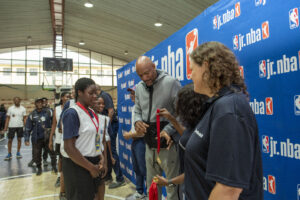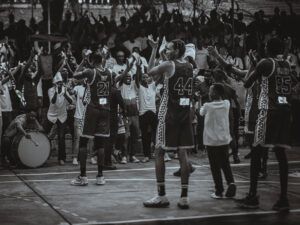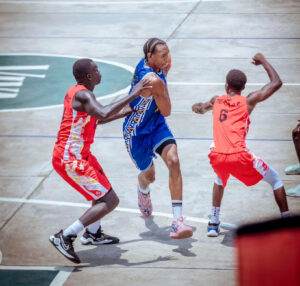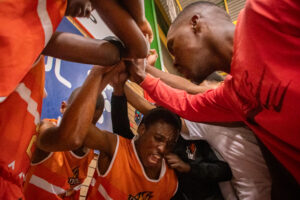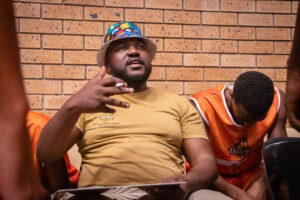Almeida waxes lyrical about his music and success on the court
IVAN Almeida has wowed crowds in the colours of Cape Verde on the international stage and in the different vests of European clubs he has played for. His exceptional talent has been rewarded with an abundance of team and individual accolades at the club level. But there is more to Almeida than just basketball.
In an interview with The Big Tip Off, Almeida waxed lyrical about his success on the court, the pinnacle of his career and his excitement when his second love – music was shared on the biggest stage in basketball.
The Cape Verdean generational talent intimated that music is one of the defining characteristics of his homeland. As soon as the music bug hit, Almeida could not help but get in on the act, citing the late great Cesaria Evora as one of Cape Verde’s influences.
“Music has been a part of my life from a young age. Cesaria is one of our most impactful artists – I think we are born with music in our blood,” said Almeida, who has avoided confining himself to a type of music. It helps that he is also a well-travelled hooper, as the exposure has diversified his artistic repertoire.
“I don’t have a genre of music. The EP I made with my friend was mostly hip-hop, R&B and pop songs… I have traditional Cape Verde songs and music from all over the world.
“I see music as another way of expressing myself… Since I have been to many countries I have absorbed different cultures and fused them into my music. I feel I have freedom when I write or produce music. I love it.”

His focus is on his first love, basketball, which gave him a taste of African club basketball. He was a key figure in helping Libyan club Al Ahli Tripoli (hosts of the preliminary stages of the Road To BAL) to qualify for the Elite 16 leg of the Road To BAL.
Almeida says he has watched the main course, the BAL, from a distance. And since its emergence, it has piqued his interest. So getting a bite at the starter Road To BAL was exciting for the 35-year-old.
“It means everything. Since the BAL started, I have kept track of it and how it has developed. It has been something at the back of mind to play in it. So being here is amazing, even if it’s the Road To BAL. The atmosphere has been amazing,” said Almeida.
Part of Al Ahli’s journey to success had a dose of sentiment for Almeida. In the last game, he had to help Al Ahli beat Kriol Star, a club he founded with his brother Joel, a player for the Cape Verdean club.
While he may have felt a tinge of emotion, Ivan, who averaged 14 points, seven rebounds and four assists in the Road To BAL, says he always plays to win.
“It was kinda weird, but I take basketball very seriously… Walter (Hodge) and I were talking at lunch. He asked, ‘You are going to play against your brother. Are you going to let him win?’. I told him, ‘no I am not. It does not matter who I play against, I play to win,'” chuckled Almeida.
He was also proud that a club from his country graced continental competition. “It is definitely a pleasure to have seen a Cape Verdean team there… My brother and I started Kriol Star – hopefully, sooner rather than later, I’ll be able to play for them to help raise our basketball,” said Almeida. “It’s amazing to see the professionalisation of the country’s (Cape Verde) basketball given where it was before… Seeing Cape Verdean players compete with other Africans is important.
“Back to the game, I take every game professionally – I told my brother we were gonna beat them.”
View this post on Instagram
While on a short-term contract with the side based in the Libyan capital (Tripoli), he is weighing his options – one of those is possibly playing in the BAL with the North Africans.
“I have signed a two week contract. My agent is still looking in places like Asia and Europe. Hopefully, I will stay here but we will see how things go,” said Almeida.
The 2019 Poland Basketball League (PLK) Finals MVP says he would like to follow in the footsteps of African greats who have played in the league. “I have watched many greats play there (the BAL) – like Carlos Morais and my teammate Walter (Hodge). I would love to be in the BAL like the African greats who have played in it,” said Almeida.
He is also one of the most accomplished players from Africa – winning league titles in Poland (2) and Portugal (3). Almeida is full of gratitude for a trophy-laden career, and he is still hungry for more.
“These last few years have been amazing for me. I finally figured out how to win, and in the last six seasons, I have won five championships,” said Almeida. “It’s been about figuring out what needs to happen to win a championship. What sacrifices do we have to make? We all play basketball because we love it. But we also want to win.
“Many players go through their careers without winning a championship. So I am grateful to have done it and at high level. Hopefully it keeps going.”

He has achieved much at the club level, but Almeida says that it does not compare to playing in last year’s FIBA World Cup. It was a historical moment for the island – being the smallest nation to qualify for the tournament.
“It’s not one of the greatest moments of my career. It is the greatest – putting Cape Verde on the big stage like the World Cup. We did it as a team and it was more than being the smallest nation at the tournament,” said Almeida. “The journey to getting there and all the sacrifices that we had to make. Not having pleasant conditions at times and many other struggles made us achieve the impossible.
“People sent messages saying thank you for representing us and putting us on the world stage. It was a superb feeling to see the gratitude of the people.”
He also described the moment his two passions collided on the global extravaganza.
“One of the greatest feelings I felt was walking to warm up… The first thing I saw was the Cape Verdean flag… I was listening to my music on the headphones. When I took them off and heard the music I released playing at the venue. I was like ‘Wow this is crazy’. I am experiencing two of my passions basketball and music. It was amazing,” concluded Almeida.
Almeida waxes lyrical about his music and success on the court Read More »



